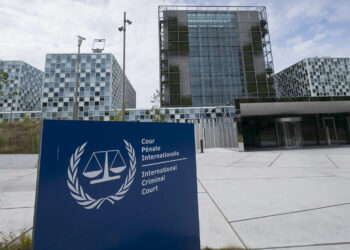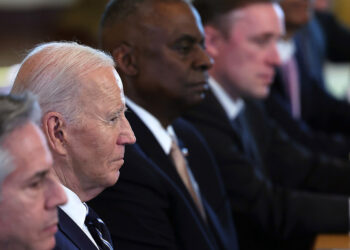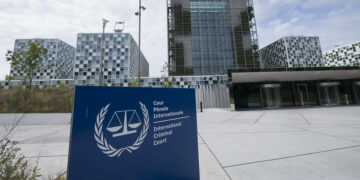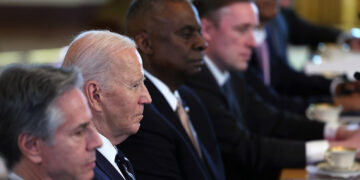Elshami and BHFS Contribute to Human Rights Abuses in Egypt by Advocating for Military Support to Country's Dictatorship
(Washington D.C., October 11, 2022) – Nadeam Elshami, an agent for Egypt, and his firm, Brownstein Hyatt Farber Schreck (BHFS), are contributing to, and benefiting from, human rights abuses in Egypt by advocating to ensure continued military support for its systematically abusive government, omitting material information about its deplorable record, said Democracy for the Arab World Now (DAWN), in a new report published today.
DAWN, Freedom Forward, and the Quincy Institute urged members of Congress to publicly pledge not to meet with Nadeam Elshami – or any other lobbyist representing abusive governments in the Middle East – and to act urgently to ban their access to U.S. government officials. "Nadeam Elshami and BHFS are whitewashing Egypt's grossly abusive human rights record to ensure continued U.S. military support for the country's dictatorship, breaching their own responsibilities under human rights law," said Raed Jarrar, Advocacy Director of DAWN. "Lawmakers should hold Elshami and BHFS accountable for their dirty work and refuse to meet with them or listen to their propaganda."
Nadeam Elshami, former Chief of Staff for Speaker of the House Nancy Pelosi, is currently a lobbyist for BHFS, where he works as a foreign agent representing the interests of the Egyptian government. The Egyptian government first hired BHFS to represent it in November 2020, and it has paid the firm a monthly fee of $65,000. Elshami and BHFS continue to press the United States for billions of dollars of military assistance to the Egyptian government, despite its widespread and systematic human rights abuses. For example, according to a FARA Supplemental Statement filed on March 30, 2021, Elshami has met numerous times with members of Congress and Congressional staff to discuss the legislation that appropriates and authorizes military aid for Egypt. On November 20, 2020, Elshami contacted a staff member of the House Armed Services Committee to discuss the National Defense Authorization Act, the legislation that authorizes, among other things, military aid to the Egyptian government and includes the human rights conditions for its disbursement. On December 18, 2020, Elshami contacted an appropriations clerk to discuss a parallel piece of legislation, the Foreign Operations Appropriations Bill, which is responsible for another step in the process for appropriating U.S. taxpayer money for military aid to the Egyptian government.
"Securing access to lawmakers through hired agents like Elshami has been crucial to the Egyptian government's efforts to whitewash its abusive tactics and obscure the country's ongoing human rights crisis, which include systematic and widespread torture, mass unlawful detentions, and extrajudicial executions," said Ben Freeman of the Quincy Institute. "It's despicable and shameful that Elshami would use the relationships he has built as a public servant in our democracy to now promote support for a dictatorship that is squashing the Egyptian people."
In their work for the Egyptian government, Elshami and BHFS have breached their human rights responsibilities under the UN Guiding Principles on Business and Human Rights (the "UN Guiding Principles"), as well as the Organisation for Economic Cooperation and Development's Principles for Transparency and Integrity in Lobbying (the OECD Principles), by contributing to, and benefiting from, the Egyptian government's human rights abuses. Elshami and BHFS appear to have provided misleading information to members of Congress, U.S. government officials, omitting material information about the well-documented gross violations of human rights by the Egyptian government, a key consideration for any approval of arms transfers.
"Elshami is effectively giving the Egyptian dictatorship access and influence over the very highest levels of power in the U.S. government," said Ben Freeman, Research Fellow at the Quincy Institute for Responsible Statecraft. "This should, at the very least, raise important questions about the dangers of allowing former government officials to trade in their years of public service for paychecks from the world's most repressive regimes."
Under the UN Guiding Principles, businesses have a responsibility to "avoid causing or contributing to adverse human rights impacts through their own activities" as well as "to prevent or mitigate adverse human rights impacts that are directly linked to their operations, products or services by their business relationships, even if they have not contributed to those impacts." Lobbying on behalf of governments, agencies, or officials like those in Egypt responsible for grave crimes, including murder, torture, and arbitrary arrests and detention, and including but not limited to misrepresenting or omitting information about their abuses of international human rights and humanitarian law, and/or obtaining, sustaining or expanding military, political or economic support for them, effectively contributes to, and benefits from their abuses.
In addition, the OECD Principles, a key instrument that provides guidance and ethical principles for the conduct of lobbying activities, recommends that all lobbyists conduct their professional activities with "integrity and honesty," provide truthful and accurate information and avoid conflicts of interest. It would be impossible for Elshami and BHFS to provide truthful and accurate information about their client's human rights abuses, as doing so would demonstrate that Egypt has failed to meet the human rights standards set forth by Congress as a condition to providing military assistance.
DAWN urges Congress to pass legislation that will bar foreign government lobbyists from gaining access to our government, including the "For the People Act of 2021" (H.R.1/S.1), which will reduce the influence of money in politics, create new ethics rules for federal officials' contact with foreign governments that have committed gross violations of human rights, and implement much needed reforms to the Foreign Agents Registration Act (FARA). DAWN also urged the reintroduction and passage of H.R.8106, the "Fighting Foreign Influence Act," which curbs foreign influence and bars former members of Congress and senior government officials from lobbying on behalf of foreign governments when their public service ends.
DAWN also urges members of Congress to pledge to refrain from meeting with lobbyists working on behalf of foreign governments where there is credible information implicating the governments in gross violations of human rights or international humanitarian law, and to refrain from lobbying on behalf of, or working for, such foreign governments when they leave public service.
"Our government must act to protect us from the malign influence of foreign government lobbyists who are misleading – if not outright lying to – U.S. elected officials," said Jarrar. "Congress should act urgently to ban lobbyists from representing abusive governments before their corroding effect on our political system grows any further, and bar elected officials from cashing in on their contacts and going to work for foreign governments when they leave office."
DAWN also made the following recommendations to lobbyings firms to ensure that their work does not violate their human rights responsibilities under the UN Guiding Principles and OECD Principles:
- Client Due Diligence: Lobbyists should conduct a due diligence review examining the human rights and humanitarian law record of a government, government agency, or government official they seek to represent and determine the extent to which their representation would contribute to, or benefit from, any of their human rights or humanitarian law abuses, including by misrepresenting or omitting information to the public or U.S. government officials and representatives about their human rights record. It should also make such reviews public.
- Bar Work for Abusive Governments, Agencies, or Officials: Lobbyists should pledge to decline representation of a foreign government, government agency, or government official where there is credible information implicating them in the commission of gross violations of human rights or international humanitarian law.
- Adopt and Pledge to Comply with the OECD Principles for their Lobbying Activities and the UN Guiding Principles: U.S. lobbyists should adopt the OECD Principles, including those aiming to enhance transparency, honesty, and accuracy in information provided by lobbyists to government officials. U.S. lobbyists should also adopt the UN Guiding Principles.
- Assess Human Rights Impact of Lobbying Activities: Lobbyists should regularly assess their existing lobbying activities for foreign governments, agencies, or officials to evaluate whether they contribute to or benefit from adverse human rights impacts, pursuant to the UN Guiding Principles. Where such contributions or benefits exist, lobbyists should take appropriate measures to address them, including, when necessary, terminating an existing lobbying contract. This assessment includes a responsibility to prevent or mitigate adverse human rights impacts that are directly linked to lobbying activities, even if the lobbyist has not contributed to those impacts.
Finally, DAWN urges U.S. state bar associations to investigate and suspend from the practice of law any lawyer who communicates false and misleading statements, including material omissions, to lawmakers and the public at large in their capacity as a lobbyist.
DAWN's Lobbyist Hall of Shame will continue to expose American lobbyists—including lawyers and former elected representatives and government officials—who are working as agents for abusive Middle East governments to garner U.S. government support, including military aid, weapons sales, and diplomatic protection.





































